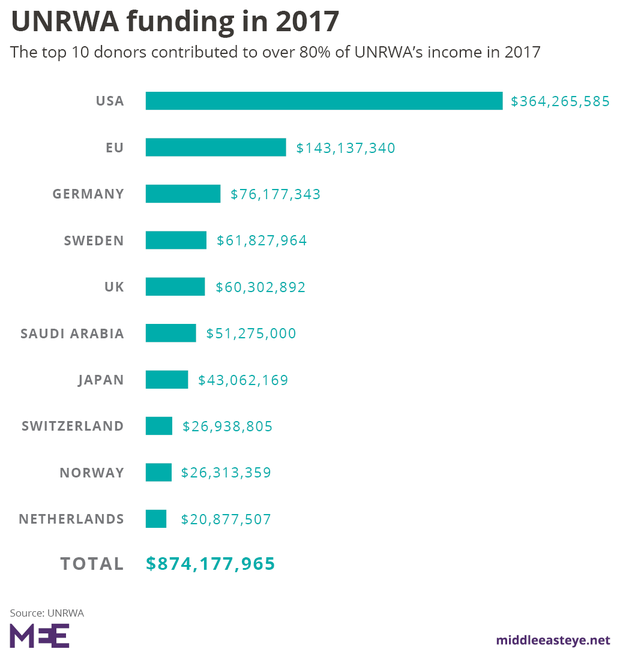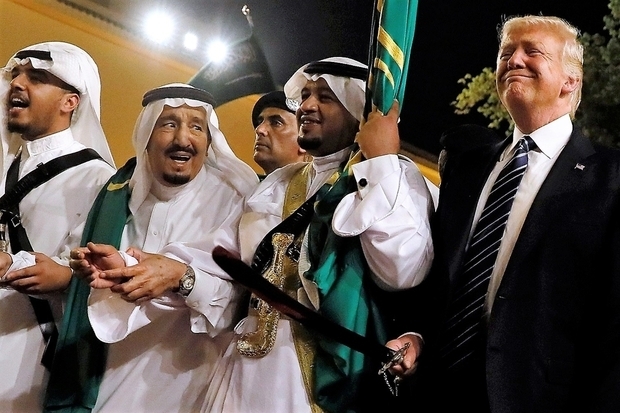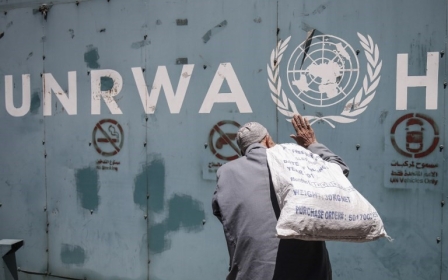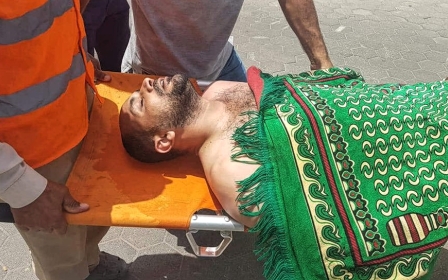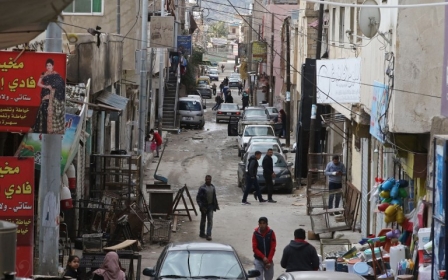Trump chaos: How US is killing all illusions of a Middle East peace
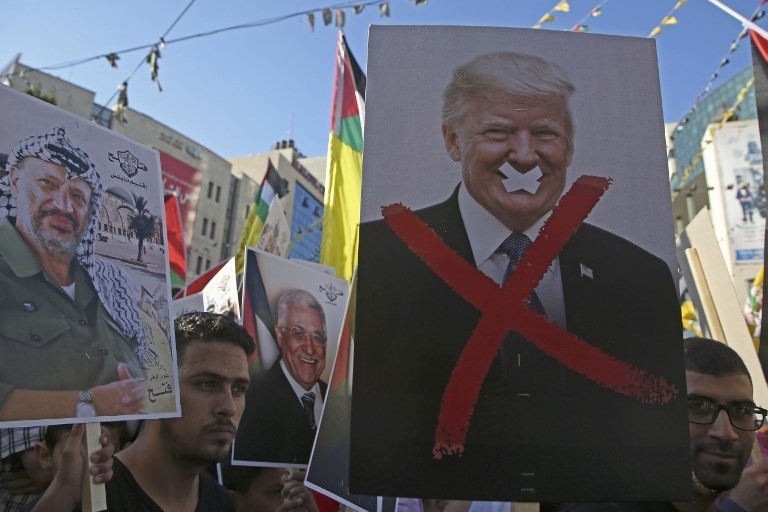
When Israel planned the blockade of Gaza after Hamas won elections in January 2006 and took charge of the enclave after clashes with Fatah in June 2007, an adviser to the then Israeli prime minister Ehud Barak put into words what few have dared to say since.
Dov Weisglass said: "The idea is to put the Palestinians on a diet but not to make them die of hunger." Weisglass's brutality was close to the bone, too blunt for the US, donor governments, the United Nations and international aid groups, who have applied much the same principle.
International aid has kept Palestinians alive, but stopped them from living. All aid short of help.
Security concerns
This is why Benjamin Netanyahu initially held his tongue when Donald Trump announced the decision to cut all US funding to the UN Relief and Works Agency (UNRWA, the agency set up in 1949 to deal with the mass displacement of 700,000 refugees) and to recognise only one-tenth of the five million refugees who are alive today.
Similarly, the first to sound the alarm over Trump's decision was Israeli intelligence. Shin Bet and the Israeli security cabinet are no closet liberals. They harbour no hidden feelings of guilt for the plight of Palestinians.
International aid has kept Palestinians alive, but stopped them from living
Like most Israelis, they failed to see the contradiction involved in objecting to the presence of a fourth generation of Palestinian refugees, while claiming a Jewish birthright to the land of Israel which extends over hundreds of generations.
Like Netanyahu, they accused UNWRA of having an institutional interest in perpetuating the refugee problem, and like Netanyahu, they could no longer tolerate even a symbolic Palestinian right of return.
No, their concern was based on security - principally Israel's. If UNWRA's schools failed to open on time this autumn, if thousands of teenagers were left kicking around the camps with little to do but pick up stones, Israeli soldiers would be in the line of fire. The policy is to sustain the conditions for the cheapest possible occupation. Conflict is expensive.They reminded their prime minister that they depended on security cooperation with the Palestinian Authority (PA) and that it was not in Israel's interest to send the Palestinian economy over the cliff and reignite protests on the Gaza border.
On Sunday night, their exasperation with Netanyahu broke surface. Israeli Channel 10 carried a report by Barak Ravid saying that Netanyahu had broken with the policy of supporting UNWRA funding in a letter sent privately to the White House two weeks ago. He had done so "without any substantial consultation with the heads of the IDF and Israel’s security and intelligence services".
Netanyahu bypassed his own ministerial committee on national security affairs. The report claims they were caught by surprise.
Arab hypocrisy
Essentially, they were blaming Trump for being more Catholic than the Pope, for proving to be in such a rush to kill East Jerusalem as the capital of a Palestinian state and to bury the refugee problem that he was in danger of ruining the whole project, which was to establish the entirety of Israel's territorial claims as facts on the ground.
Trump's reasoning was cruder than that. As voiced by his UN ambassador, Nikki Haley, Palestinian President Mahmoud Abbas is biting the hand that feeds him by refusing to negotiate, and embarrassing the US and Israel in the UN.
Trump’s actions are indeed making life more difficult for his Arab allies. He is exposing their hypocrisy in forever rushing to defend their Palestinian brothers but never quite managing to come to their aid
"Americans are very generous people. We are humanitarian-oriented. And we continue to seek out ways to help the Palestinian people, whose plight is of genuine concern to us," Haley said. "But we are not fools. If we extend a hand in friendship and generosity, we do not expect our hand to be bitten. And as we extend our hand, we also expect others to extend theirs as well," she told the UN Security Council.
It signed deals of intent worth $110bn with the US for arms, while spending only $51m on UNWRA, the sixth-largest donor after the UK. Trump is exposing Arab hypocrisy as no US president has done before.
Trump: A real danger
He is also cooking up an internal crisis for two allied Arab states, Jordan and Lebanon. The domestic stability of both depends on keeping the definition of a Palestinian refugee as it is. Once Trump dismantles UNWRA, millions of refugees will lose not just their schools and health services and income support but their status and identity.
However, they will not vanish into thin air. Robbed of their dream of returning to Palestine, and with little incentive to stay where they are, where then will they go? Their obvious destination would be to head north and make it for Europe.
Trump is doing Palestinians a favour by kicking away the props, destroying all the pretence, erasing all the make-up that has been layered on to the Oslo process
How would Germany and France feel to have another wave of refugees heading for Europe's shores. This is not a remote possibility if the status quo in the Palestinian camps is broken forever.
You can see why he has never been able to publish the "deal of the century". The more details are revealed, the less anyone would want to put their name to it. In Asia, Trump met North Korea's leader at a summit without a plan. In the Middle East, he has a plan which can never materialise into a summit. In both cases, Trump presents a real danger.
Doing Palestinians a favour
There is only one upside of the chaos that Trump is causing to the central and dominating conflict of the Middle East. And this should not be underestimated. Trump is doing Palestinians a favour by kicking away the props, destroying all the pretence, erasing all the make-up that has been layered on to the Oslo process.
Everything that for decades sustained the myth that one day in the bright, blue future, a Palestinian state could be born peacefully through negotiation is now disappearing. The physical space for it is shrinking.
Conversely, it is now legal for settlers to take Palestinian land, even if its owned privately, as long as they do this "in good faith". Indeed, the new Basic Law expresses in words as brutal as those used by Weisglass that settlement is a moral imperative of the Jewish state.
What should Palestinians who stick exclusively to non-violent means do to defend their vanishing rights? What now is the purpose of the Palestinian Authority? Should it continue to exist as a sub-contractor of Israeli security? I am not sure that sounds too appealing.
Surely the only response to having your whole file of claims taken "off the table", along with your lands, olive groves, houses, schools, water, history and refugees and institutions, is to hand the keys back to the nearest Israeli military commander.
"Go on, occupy us. We are all yours. All 5.79 million of us are your responsibility," Mahmoud Abbas should now say. He has nothing else left to do.
- David Hearst is editor-in-chief of Middle East Eye. He was chief foreign leader writer of The Guardian, former Associate Foreign Editor, European Editor, Moscow Bureau Chief, European Correspondent, and Ireland Correspondent. He joined The Guardian from The Scotsman, where he was education correspondent.
The views expressed in this article belong to the author and do not necessarily reflect the editorial policy of Middle East Eye.
Photo: Palestinian protesters stage a pro-Fatah rally in the West Bank city of Nablus on 17 July (AFP)
This article is available in French on Middle East Eye French edition.
Middle East Eye propose une couverture et une analyse indépendantes et incomparables du Moyen-Orient, de l’Afrique du Nord et d’autres régions du monde. Pour en savoir plus sur la reprise de ce contenu et les frais qui s’appliquent, veuillez remplir ce formulaire [en anglais]. Pour en savoir plus sur MEE, cliquez ici [en anglais].



